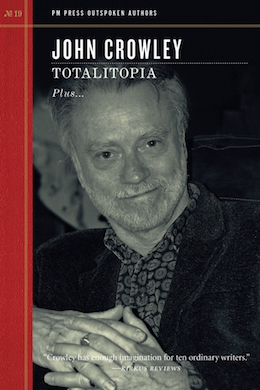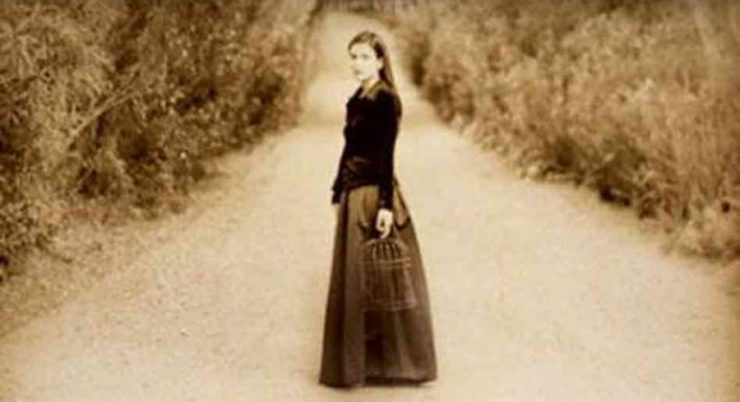At Readercon a few years ago, I attended a panel on favorite science fiction and fantasy books. One author, one of the best working today, talked about the near-impossibility of writing a book so perfect as John Crowley’s Little, Big. There were wistful sighs from writers in the audience and nodded agreements from other panelists. Everyone in the room at that most bookish convention recognized that competing with Crowley was impossible.
Yet in many fan circles Crowley remains unknown. This literary master of the hermetic, hidden, and esoteric has for too long been as hidden as the obscure histories, gnostic theorists, and addled visionaries that populate his work. Despite the many awards; despite the praise of luminaries both inside the genre community, like Ursula K. Le Guin and Thomas Disch, and outside it, like Harold Bloom; despite his inclusion in both Bloom’s Western Canon and Gollancz’s Fantasy Masterworks, most fantasy readers don’t read him. Perhaps this is the year that changes.
PM Press, a radical independent publisher based out of Oakland, California, has just published a new Crowley book, Totalitopia, as part of its ongoing Outspoken Authors science fiction series. Though the Outspoken Author books are all short—around 100 pages, give or take—they manage to contain a great deal: New and reprinted writing, a bibliography, and original interviews.
 Almost all the material in Totalitopia, aside from the opening story and the concluding interview, has appeared elsewhere, but only one piece, the short story “Gone,” has appeared in a previous Crowley collection. Unless you’re a magazine fiend with subscriptions to Lapham’s Quarterly, This Land, Harper’s, and the Boston Review, you’re unlikely to have encountered these works before..
Almost all the material in Totalitopia, aside from the opening story and the concluding interview, has appeared elsewhere, but only one piece, the short story “Gone,” has appeared in a previous Crowley collection. Unless you’re a magazine fiend with subscriptions to Lapham’s Quarterly, This Land, Harper’s, and the Boston Review, you’re unlikely to have encountered these works before..
The opening story, “This Is Our Town,” examines a familiar Crowley theme, the Catholic childhood and maddening persistence of belief, in an original way. The story’s unnamed narrator is simultaneously a reader of and a character in a book for Catholic schoolchildren of the fifties.
When I was young I lived in a place called Timber Town. It can be found in a book called This Is Our Town, which is part of the “Faith and Freedom” series of readers, and was written by Sister Marguerite, SND (which stands for Sœurs de Notre-Dame) and published by Ginn and Company, copyright 1953. Catholic children read it in the fourth and fifth grades.
The narrator remembers talking to her guardian angel, seeing ghosts and spirits, pondering the metaphysics of prayer, and wishing she could be a priest. She’s left Timber Town and her childhood beliefs, yet still they haven’t completely abandoned her: “I still know now in the deepest part of me that it’s so, and that all will be well, all will be well, all manner of thing will be well.”
A whole collection of similarly enigmatic and wistful stories would be welcome, but so are the following texts, nonfiction that demonstrates the wide range of Crowley’s talents. The title essay, on the (im)possibility of predicting the future and the role of prognostication in science fiction, is, as per usual Crowley fashion, beautifully written and intellectually provocative, though some of its insights on science fiction may be more striking to readers with little sf background. The topic of “Everything That Rises,” on the other hand, will be unfamiliar to almost everyone. Crowley introduces us to Nikolai Fedorovich Fedorov, “a central figure in Russian thought” still almost entirely unknown outside his home country. This nineteenth-century “cosmist” whose utopian project “was to find the means and the will to defeat death” has in a way achieved his goal. Though no one has abolished death, Fedorov’s ideas still have inspire, and some even hope that science will allow a universal resurrection: Crowley attends a cosmist conference in New York whose attendees promise exactly that. It’s a meeting of the sublime (immortality, reconstitution and resurrection, our future in the stars) and the bathetic mundane (PowerPoint lectures, boxed coffee, folding chairs).
“Gone” and “And Go Like This” are both gently political fables; the first a tale of household unrest and strangely obliging aliens, the second a Bradbury-esque literalizing of the idea of a global village. “In the Tom Mix Museum” is flash fiction Americana, a two-minutes’ dream of cowboys, six-shooters, and loyal steeds; it’s the shortest and least essential piece of the collection, but I’m glad it was included.
A long review of Paul Park’s career closes out the volume’s reprinted material. Park is a strange and often difficult writer; like Crowley, he has “[written] a series of unique novels that might seem to fit various common rubrics but actually don’t.” Though occasioned by the publication of a story collection, Other Worlds, Crowley’s review covers the entirety of Park’s career, from Soldiers of Paradise to All Those Vanished Engines. He lavishes particular praise on Park’s four-volume Roumania series, and his creation of an alternate world equally “complex, irreducible, [and] indifferent or hostile to human success” as our own. Anyone who has read this far in Totalitopia will want to read more Crowley; once they’ve read “Paul Park’s Hidden Worlds,” they’ll be inclined to try Park too.
The concluding interview, conducted by Terry Bisson, is extremely enjoyable; I wish it continued for twice its fifteen pages. There are great anecdotes, including a meeting with Andy Warhol, and insights into his writing, as when Crowley describes his realistic novel Four Freedoms as an attempt to write a plausible, if temporary, utopia. Crowley and Bisson clearly know and like each other; the interview is a conversation between friends, not a rote publicity exercise.
One of Bisson’s final interview questions concerns the reviews Crowley has received throughout his career. Crowley responds that “I’ve actually had very few bad reviews. I’ve wondered if this is because reviewers who are among the small band of committed readers of my books somehow manage to get the review copies and submit positive reviews.” Perhaps this is true, and there really is a conspiracy of Crowley reviewers, working in the shadows to sell his books and spread his name, but there’s a simpler explanation: Critics love him because he’s a great writer who deserves thousands of readers. If the conspiracy isn’t real, perhaps now is the time to organize it. I hope you’ll join me.
Matt Keeley reads too much and watches too many movies; he is helped in the former by his day job in the publishing industry. You can find him on Twitter at @mattkeeley.











John Crowley’s work is wonderful and the same goes for Paul Park. They deserve to be mentioned in the same vein as Gene Wolfe, as far as I am concerned. Also, if you like “Little, Big,” I suggest you try Greer Gilman’s “Moonwise.” It’s a very different book but I think the audience is the same.
If I’d never read anything else by Crowley, I’d remember him for the first few sentences, and the last few, in Engine Summer. Haven’t read them in decades, but still remember them clearly.
Just about perfect, in their small ways.
I’ve had a copy of “Little Big” for about three years and still not read it, sounds like I’d better do something about that.
I highly recommend the “Aegypt” series. The first three books (Aegypt – revised title The Solitudes – Love and Sleep, and Demonomania) were released in revised versions when the 4th book , Endless Things, came out. This 4th book was also revised the next year. I also recommend The Evening Land: Lord Byron’s Novel which is the most amazing reproduction of Byron’s voice. Many have tried, but only Crowley succeeds.
Crowley is a genius and has produced some of the best modern fiction either in or out of SF. “The Translator” and “Four Freedoms” are beautiful novels, as well as all the works mentioned.
What annoys me is that some people say they “bounced off” “Little Big” or “Aegypt”, and just give up on the books because they demand attention and concentration to fully be appreciated. They may not always be easy reads but they repay all the work put in to reading them. I can think of no other books in the field that are so rewarding to reread.
@5: So sorry to annoy you, but yes I never got past page 100 of Little, Big, despite several tries over 35 years. It’s boring, plain and simple. And I will never understand the notion that “all the work put in to reading” is a virtue—not when there are so so so many other things to read and watch. No one work in history is worth that much time and effort.
Crowley has a new novel coming out in October titled ‘Ka: Dar Oakley in the Ruin of Ymr’ from Saga Press.